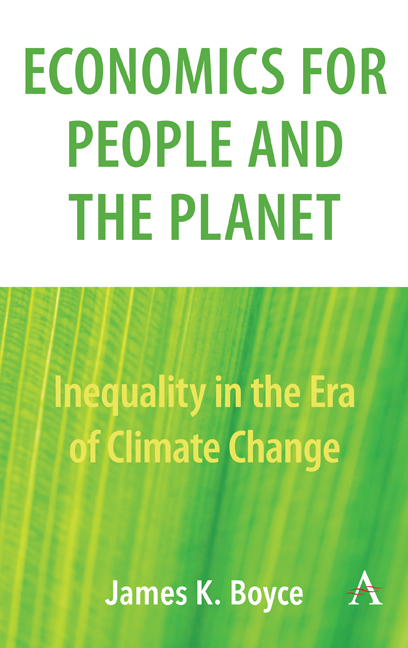Book contents
- Frontmatter
- Contents
- List of Illustrations
- Acknowledgements
- Part I Rethinking Economics and the Environment
- Part II Environmental Injustice
- Chapter 9 Inequality and the Environment
- Chapter 10 Clean Air for All
- Chapter 11 Letter from Flint
- Chapter 12 Let Them Drink Pollution?
- Chapter 13 Letter from Delhi
- Chapter 14 Mapping the Environmental Riskscape
- Chapter 15 Measuring Pollution Inequality
- Chapter 16 Cleaning the Air and Cooling the Planet
- Part III Climate Policy
- Notes
- Publication History
- Index
Chapter 10 - Clean Air for All
from Part II - Environmental Injustice
Published online by Cambridge University Press: 12 February 2019
- Frontmatter
- Contents
- List of Illustrations
- Acknowledgements
- Part I Rethinking Economics and the Environment
- Part II Environmental Injustice
- Chapter 9 Inequality and the Environment
- Chapter 10 Clean Air for All
- Chapter 11 Letter from Flint
- Chapter 12 Let Them Drink Pollution?
- Chapter 13 Letter from Delhi
- Chapter 14 Mapping the Environmental Riskscape
- Chapter 15 Measuring Pollution Inequality
- Chapter 16 Cleaning the Air and Cooling the Planet
- Part III Climate Policy
- Notes
- Publication History
- Index
Summary
Environmental justice is good for white folks, too.
Is environmental racism good for white folks? The answer isn't as obvious as it might seem.
In the United States, there is plenty of evidence that African Americans, Latinos, Asian Americans and Native Americans typically face greater pollution burdens than whites, with associated health risks. So if the same total amount of pollution was spread more evenly, whites would wind up breathing dirtier air.
But would total pollution remain the same? Or would pollution decline if it was no longer disproportionately inflicted on minorities?
A study by a team of researchers at the University of Massachusetts Amherst finds that the quantity of toxic air pollution from industrial facilities is a variable, not a constant, and that the total pollution load is correlated with the extent to which minorities bear higher-than-average pollution impacts.
Our team measured the extent of disparities in US metropolitan areas by comparing the share of minorities in total exposure risks from industrial air toxics, calculated from US Environmental Protection Agency data, to their share of metropolitan population. In Birmingham, Alabama, for example, minorities bear 62 per cent of the exposure risk but comprise only 31 per cent of the population.
In metropolitan areas that rank in the top 5 per cent nationwide in the difference between the share of exposure risk borne by minorities and their share of the population–what we call the ‘minority discrepancy’–the average toxic exposure for all residents is more than double that in metropolitan areas that rank in the lower 75 per cent. In high-discrepancy cities, average exposure for minorities is almost four times more than in low-discrepancy cities, but for whites, too, average exposure is higher by a factor of about 60 per cent.
There are two main ways this striking correlation may be explained. One possibility is that wider discrepancies lead to more pollution. The perception that environmental costs can be shifted onto minorities may translate into weaker environmental regulation at existing facilities and greater willingness to accept new polluting facilities. If so, the fact that whites end up breathing dirtier air, too, implies that they do not fully escape the consequences.
A second possibility is that more pollution leads to wider discrepancies. Some cities may have high levels of industrial pollution for historical reasons, such as proximity to markets or inputs.
- Type
- Chapter
- Information
- Economics for People and the PlanetInequality in the Era of Climate Change, pp. 49 - 52Publisher: Anthem PressPrint publication year: 2019



